CNAY recognizes May 5-9, 2025 as the National Week of Action for Missing and Murdered Indigenous Persons (MMIP), centering youth voices, uplifting community-led efforts and calling on the nation to honor our relatives through awareness, solidarity and action.
Throughout the week, we will continue to update the below content offering support, resources and ways to get involved in the movement for Tribal communities and allies alike.
A Message from CNAY’s Executive Director to Native Youth
Shekoli, Greetings-
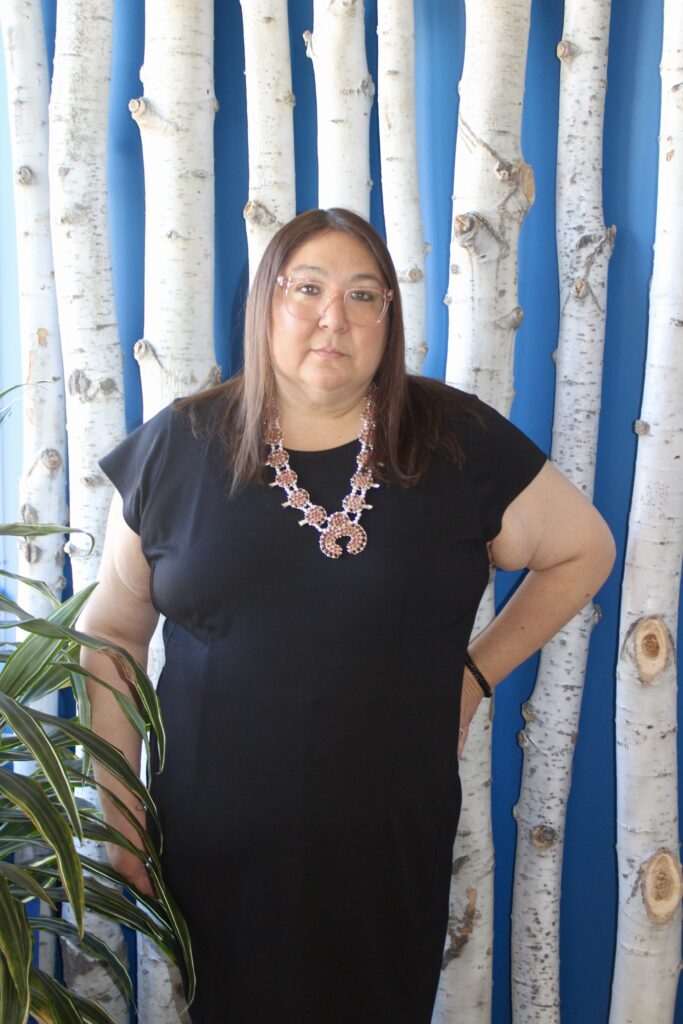
Today, on the National Day of Awareness for Missing & Murdered Indigenous Persons (MMIP), we dedicate time and space to honor and remember our relatives. Each of us, from tribal and urban communities alike, has felt the impact of the MMIP crisis. Many of our sisters, mothers, wives, aunties, daughters and friends have been stolen from us, most often at the hands of those outside of our communities.
As we know all too well, the statistics are staggering. The rates of MMIP far surpass any other group of people in the country. For Native women it is a leading cause of death. Maybe today you are wearing red in solidarity, or taking part in a march or rally, demanding justice for our stolen relatives. Perhaps you are working on legislation to help fix the jurisdictional roadblocks faced by law enforcement when trying to solve a case, or sharing resources on social media to encourage others to get involved. However you choose to contribute to the cause, know that your actions are impactful. You are medicine. You make your ancestors proud.
But I also know this day can be triggering and that the work can be taxing. So I encourage each of us to hold space for our own healing, to pause when needed and to care for ourselves with the same compassion we offer to others. Burn some cedar or sage, offer tobacco to the ancestors, read a book, talk to a friend, hug someone special to you. Please be kind to yourself and know that support is always available. It is important that you stay well and healthy – physically and emotionally – to continue the fight.
Today, I am wearing red in honor of our missing relatives, and I will take a few moments to pray for all those who have gone before us. I will sit in gratitude that we have so many people, young and old, fighting to protect others from this harm. And finally, I will uplift your voices, those of our youth who are doing inspiring work to protect our peoples and our cultures for the next seven generations.
Yaw^ko and Mvto. Thank you.
Tracy Canard Goodluck
Executive Director, Center for Native American Youth
Resources
Not One More: Findings & Recommendations of the Not Invisible Act Commission
The Not Invisible Act, authored by then-Rep. Deb Haaland, passed into law in October 2020, established the Commission as a cross-jurisdictional advisory committee composed of both federal and non-federal members, including law enforcement, Tribal leaders, federal partners, service providers, family members of missing and murdered individuals, and survivors. The Commission has developed recommendations – officially released on November 1, 2023 – through the work of six subcommittees focused on improving intergovernmental coordination and establishing best practices for state, Tribal and federal law enforcement to bolster resources for survivors and victims’ families and combatting the crises of missing persons, murder and trafficking of AI/AN peoples.
National Indigenous Women’s Resource Center (NICWA)
The National Indigenous Women’s Resource Center, Inc. (NIWRC) is a Native-led nonprofit organization committed to ending violence against Native women, children and communities. They provide national leadership in addressing violence within Tribal communities by amplifying the voices of grassroots advocates and offering resources, technical assistance, training and policy development. NIWRC’s work strengthens Tribal sovereignty, creating lasting change to protect Native women and their families. They have a vast library of educational information, resources and action items dedicated to the MMIP crisis: https://www.niwrc.org/mmiwr-awareness
Coalition to Stop Violence Against Native Women (CSVANW)
The mission of the CSVANW (Coalition to Stop Violence Against Native Women) is to eradicate violence against Native women and children by championing social change within our communities. They are dedicated to taking responsibility for the future wellbeing of Native women and children. Through the pillars of support, education and advocacy, CSVANW leverages collective strengths, power and unity towards the creation of violence-free communities. Their vision encapsulates the essence of our efforts: fostering Healthy Families, Healthy Communities, guiding a commitment to healing and transforming our communities into safe, nurturing spaces for the growth and prosperity of all its members.
The Picture Project by Autumn McMillan
Autumn McMillan (Mississippi Band of Choctaw Indians) is a 2023 Remembering Our Sisters Fellow. Her project culminated in an educational booklet that included photos of members of the Choctaw Nation along with information about the MMIWG2s+ epidemic.
Using Art for Activism: Missing & Murdered Indigenous Women, Girls & Two-Spirit People
Evynn Ksé:hahiyé Richardson (Haliwa-Saponi) is a 2022 Remembering Our Sisters Fellow. The Using Art for Activism toolkit provides various tips and resources to help guide individuals willing to use art to uplift our stolen relatives and spread awareness of the injustices they have faced and continue to face. The toolkit hopes to ensure individuals are being mindful of those directly affected, culture and more, while also encouraging respect for the stories told through art.
@MMIWhoIsMissing [Instagram account]
MMIP | Who Is Missing: Content & TW ⚠️ | This page is dedicated to the epidemic of MMIP + mutual aid 📍
Urban Indian Health Institute (UIHI) Missing & Murdered Indigenous Women & Girls [2017 report]
Nationwide, the voices of Indigenous people have united to raise awareness of missing and murdered Indigenous persons (MMIP). Though awareness of the crisis is growing, data on the realities of this violence is scarce. To fill this gap, in 2017, Urban Indian Health Institute (UIHI), a tribal epidemiology center, began a study aimed at assessing the number and dynamics of cases of missing and murdered American Indian and Alaska Native women and girls in cities across the United States. This study sought to assess why obtaining data on this violence is so difficult, how law enforcement agencies are tracking and responding to these cases, and how media is reporting on them.
Understanding MMIP
The MMIP crisis is not random—it is the result of systemic forces that continue to endanger our communities. We’re sharing deeper context on three often-overlooked contributors to this ongoing crisis:
![]() Extractive industries and “man camps”
Extractive industries and “man camps”![]() U.S. military presence on Native lands
U.S. military presence on Native lands![]() Supreme Court rulings that weaken Tribal justice systems
Supreme Court rulings that weaken Tribal justice systems
These realities may not always make headlines, but they shape our lives.





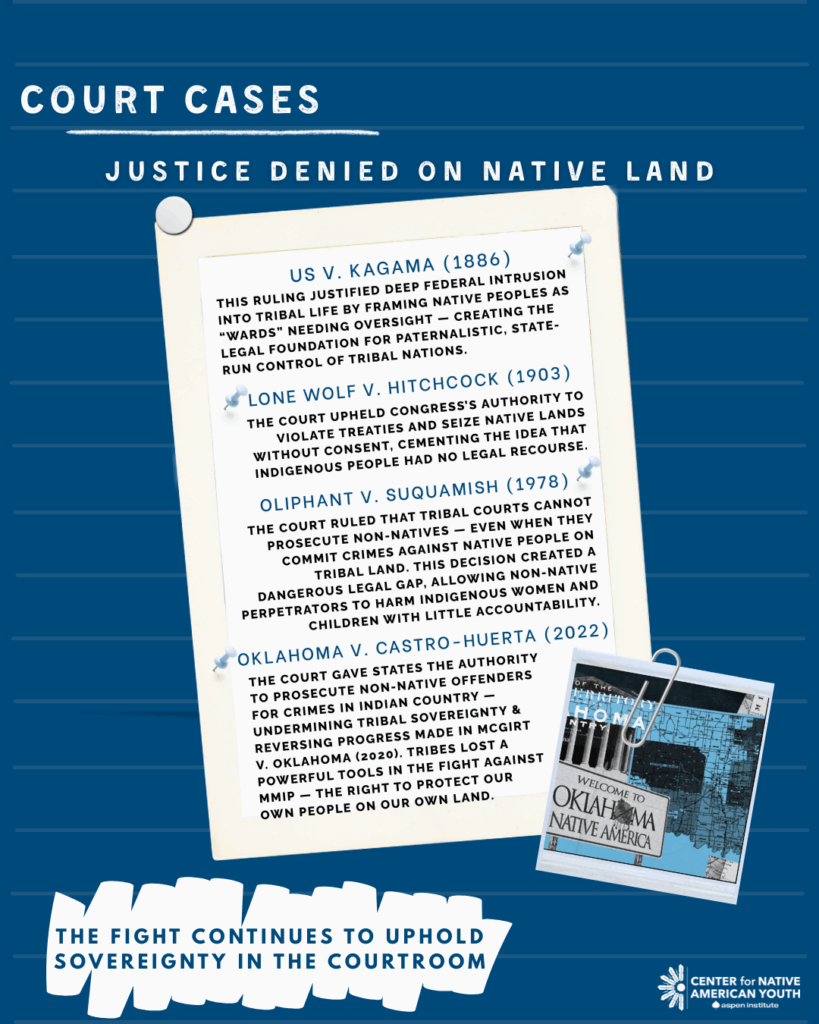
Sources:
- Resilience Amidst Loss by Lily Joy Winder
- MMNHWG Task Force Report
- Water Protector Legal Collective
- Violent Against Indigenous Women and the Extractive Industry | PAVE
- DOJ MMIP Resources
Youth Voices on the MMIP Crisis
We’re honored to spotlight the incredible work of some former Remembering Our Sisters Fellows. From meetings at the White House to powerful words and multimedia projects, these young leaders are driving change and uplifting the voices of their communities.
Sage Chief
Oglala Lakota & Diné
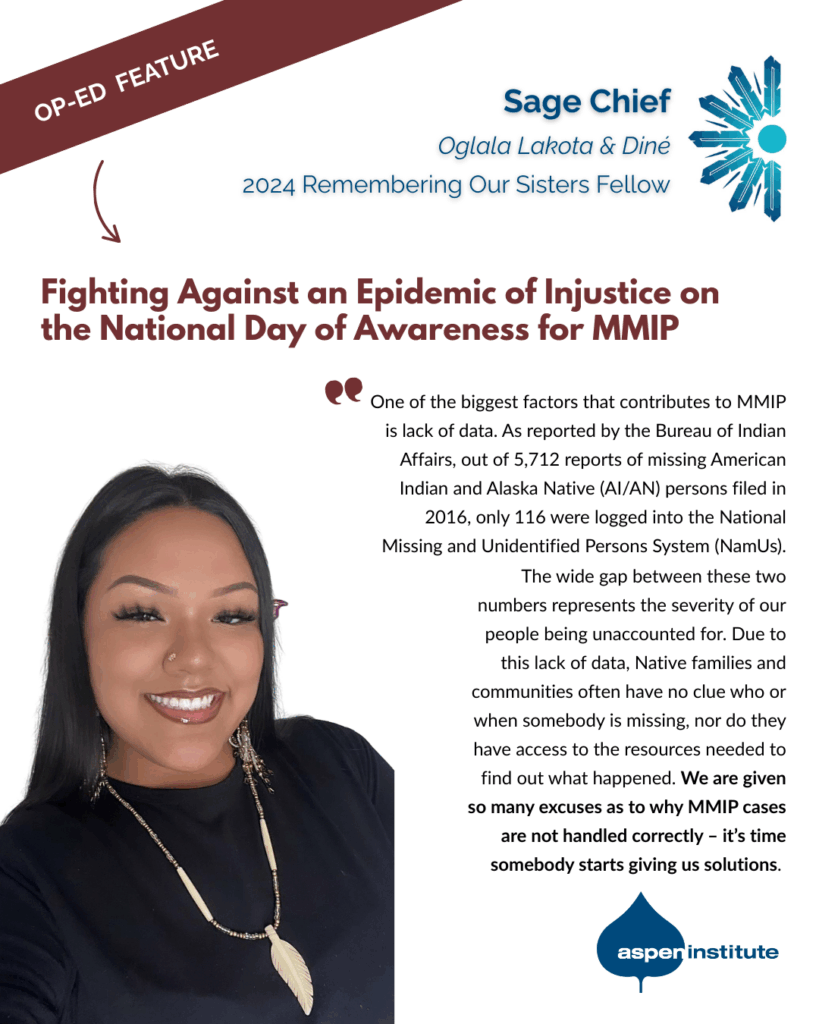
McKaylin Peters
Menominee, Oneida & Forest County Potowatomi
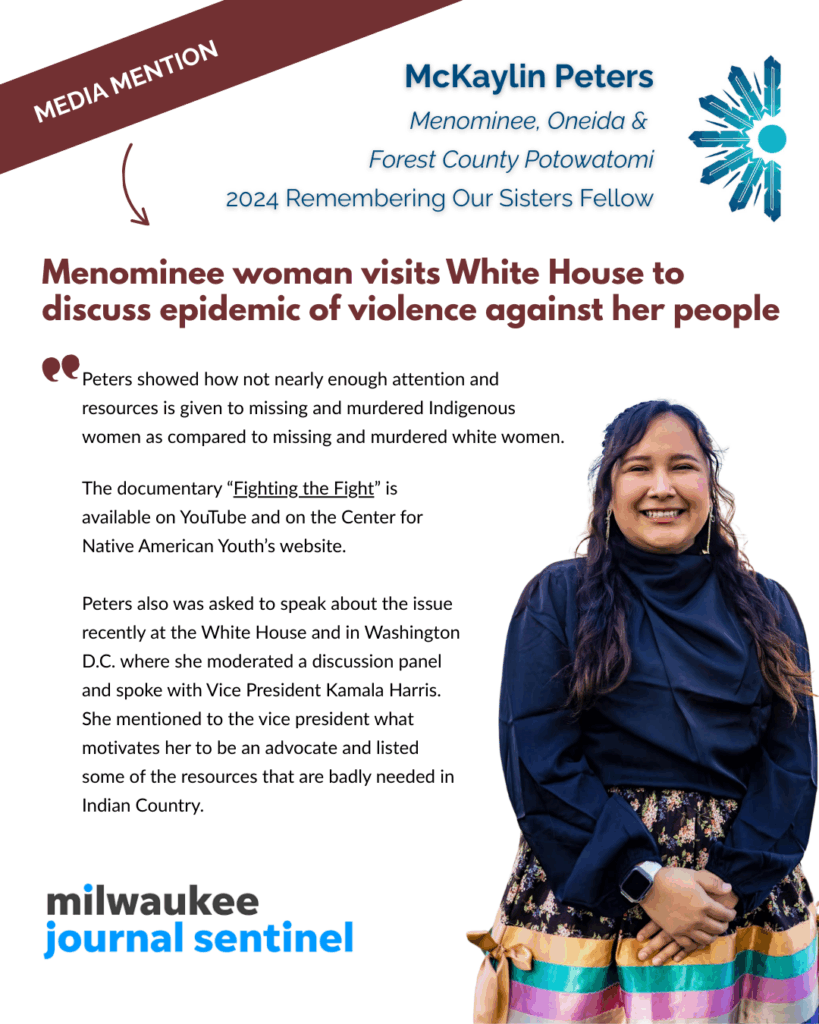
Christina Kaltsukis
Yakama Nation
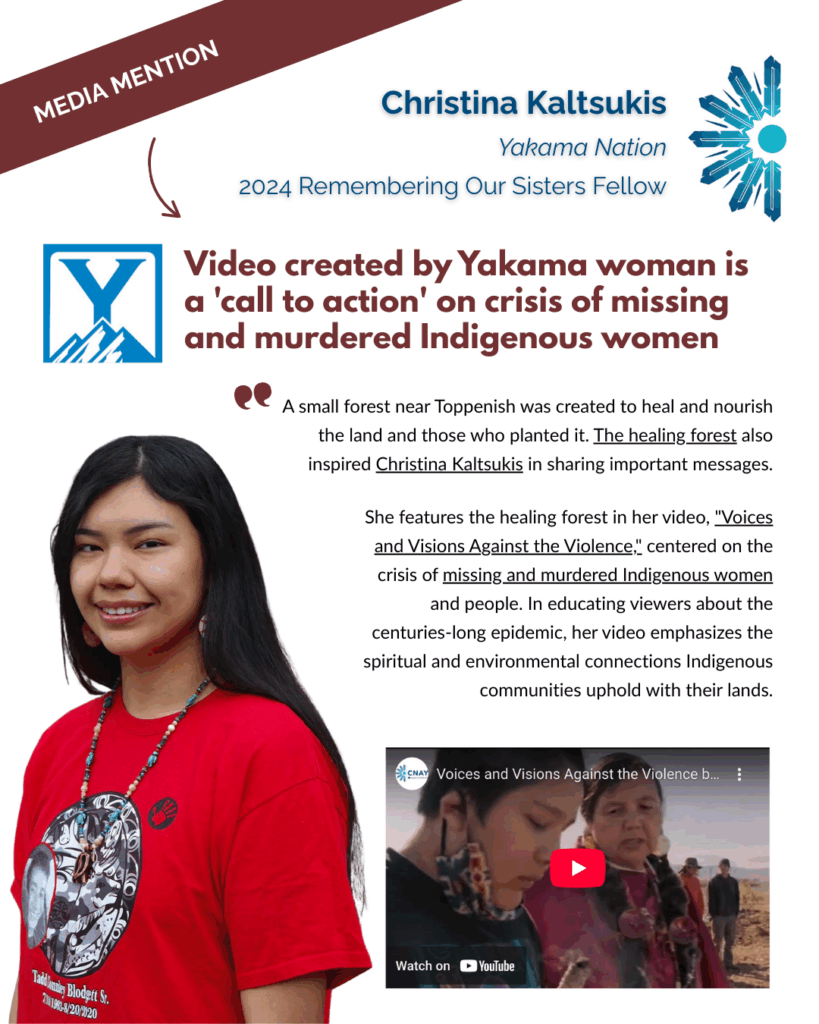
Danielle Fixico
Chickasaw, Muscogee Creek & Choctaw
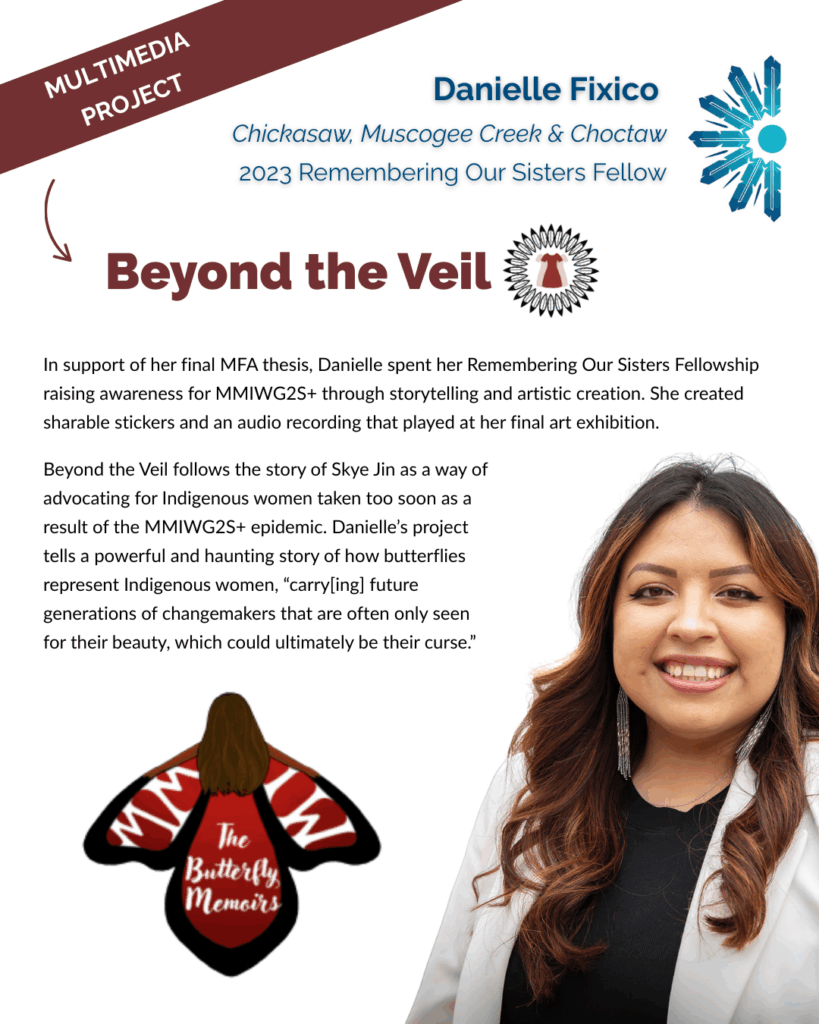
These stories are a testament to the resilience and strength of Indigenous youth leaders, fighting for justice and visibility.
How to Get Involved?
Ending the Missing & Murdered Indigenous Persons crisis requires advocates, allies & community support. Want to be involved with the movement but not sure how to get started? We reached out to advocates from across Indian Country to share a little bit about what they do and their advice for youth who want to join in the fight for justice. Here’s what they had to say…
Become an MMIP Ally
- Donate or Volunteer: Join Indigenous-led organizations working on this issue.
- Call Your Representatives: Support legislation, lawmakers & leaders addressing MMIP – tell them to make the crisis a priority!
- Seek Additional Resources: Reach out to one of the advocates featured here.
- Uplift Voices: Share on social media & keep your communities informed!
The Future of the Movement
The 2025 Remembering Our Sisters Fellows are the future of the Missing & Murdered Indigenous Persons movement. They find grounding through their advocacy, paving the way for a future where Indigenous communities are seen, heard & protected. ❤️


 Democracy is Indigenous
Democracy is Indigenous